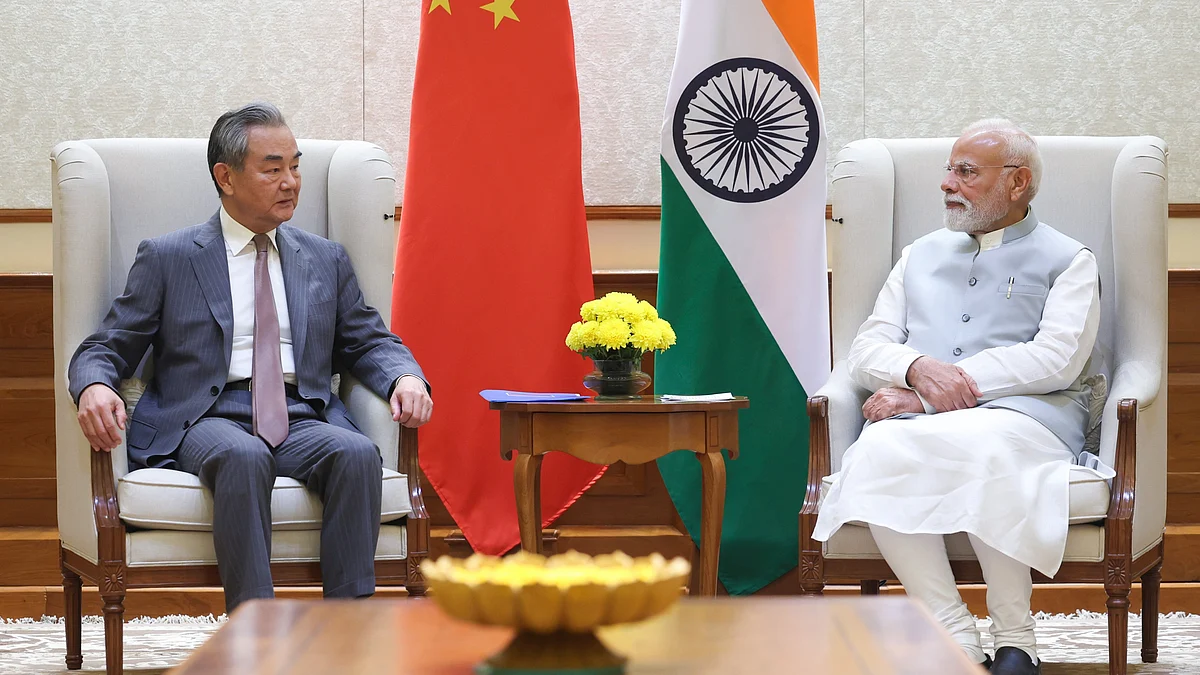The Dance of the Dragon and the Elephant in Delhi breaks the ice?
On the 75th anniversary of India–China relations, they should be partners, not view each other as threats, says China's foreign minister Wang Yi — and flies to Islamabad

In a written answer in the Lok Sabha on 19 August 2025, the Government of India acknowledged that because of Chinese restrictions on the export of fertilisers and rare earth minerals and magnets, besides tunnel boring machines (TBM), the supply chains in India’s agriculture, automobile and infrastructure sector had been badly hit.
On the same day, ironically, Chinese foreign minister Wang Yi was on a two-day visit to New Delhi — before flying to Islamabad.
Even as diplomats and foreign ministry statements from both sides exuded warmth and optimism about Wang Yi’s first visit to India in three years, there was no indication of any breakthrough or assurance on the export impasse.
The Economic Times did report that China had indeed promised to address India’s three concerns — namely “rare earths, fertilisers and tunnel boring machines” — but official statements spoke nothing of these. Even the post on social media by the Chinese ambassador to India was conspicuous by its silence on the issue.
While both sides took pains to describe the visit as a sign of progress in bilateral relations — and statements from Wang Yi and other members of the Chinese delegation, on the one hand, and from India's NSA (national security advisor) Ajit Doval and MEA (minister of external affairs) S. Jaishankar, on the other, were undoubtedly effusive.
However, if there were concrete signs of a breakthrough, they were so couched in diplomatese as to be unintelligible to the hoi polloi.
Or perhaps they were left for PM Narendra Modi to announce on his visit to China later this month.
The Indian prime minister will embark on a visit to Japan around 29 August and, after concluding that trip, he will travel to the northern Chinese city of Tianjin for the SCO (Shanghai Cooperation Organisation) summit. PM Modi’s visit to China is being planned amid efforts by the two sides to repair their bilateral ties, which have come under severe strain following the deadly clashes between Indian and Chinese troops in Galwan Valley in June 2020.
Neither side made any mention of this or more recent stresses (those from Operation Sindoor, when China was seen standing by Pakistan) in their bilateral relations. The four-day war also witnessed Pakistan claiming to have downed Indian fighter planes in its own air space with the help of Chinese missiles. There was no indication, though, whether India’s hot-and-cold relationship with Pakistan also came up for discussion.
Another mild flutter was caused on Tuesday by the Chinese state news agency Xinhua reporting that Dr Jaishankar had conveyed to the visiting Chinese foreign minister that India recognised "Taiwan is a part of China". The MEA didn't mention it in its press release, but Chinese journalists quoted members of the Chinese delegation on his having said so.
WhatsApp messages from ‘sources’ (per news agency ANI) in the MEA soon went out to deny the claim: “There is no change in our position on Taiwan. We stressed that like the rest of the world, India has a relationship with Taiwan that focuses on economic, technology and cultural ties. We intend to continue it.”
The allegedly 'warming' China–India ties, meanwhile, have coincided with a downturn in India–US relations, driven by a largely failed trade deal between the two countries that were once closer because of their shared interest in countering China.
Meanwhile, the new round of India–US trade negotiations in New Delhi later this week has reportedly been postponed, with India expected to be hit next week with a 50 per cent tariff imposed by Washington.
The White House has sent multiple signals to Delhi indicating that India faces larger penalties because of its engagement with Russia, especially its growing oil trade. However, China — which purchases more oil from Russia than India — has been treated more deferentially by US president Donald Trump.
To complicate matters further, both Washington and Beijing seem determined to strengthen ties with Islamabad — to the discomfiture of India.
On a more positive note, Wang Yi said as the two largest developing countries with a combined population of more than 2.8 billion, India and China, should demonstrate a sense of global responsibility, act as major powers and set an example for developing countries.
Follow us on: Facebook, Twitter, Google News, Instagram
Join our official telegram channel (@nationalherald) and stay updated with the latest headlines
